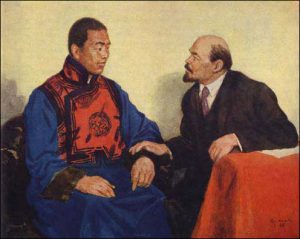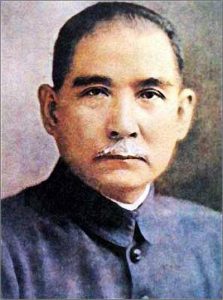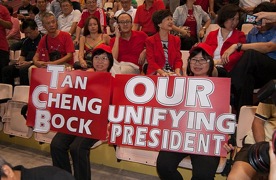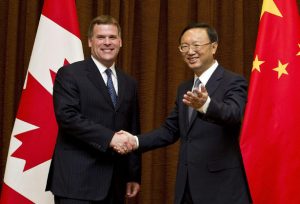Why No Anti-Mining Party in Mongolia? Why No Pro-Mining Movement?
Memo #106 – Next week, German Chancellor Angela Merkel is scheduled to address the Mongolian parliament. Her visit will come during a tumultuous period as Mongolian politicians prepare for parliamentary elections in summer 2012. Recently, 20 MPs petitioned the government to revisit the 2009 Investment Agreement signed with Ivanhoe Mines and Rio Tinto for the giant Oyu Tolgoi (OT) gold and copper project. The petition sent shares and Mongolia’s credibility as a natural resource investment destination momentarily tumbling. No enduring anti-mining coalition is behind this petition, nor has a pro-mining, single-issue party emerged.
U.S. Arms Sales to Taiwan a Sore Point in U.S.-China Relations
Memo #105 – The Obama administration’s decision to sell arms to Taiwan clouds bilateral relations with China. The timing is not ideal. Global economic recovery is volatile and tensions are increasing in the South China Sea. Next year, there will be a leadership transition in China and the U.S. will hold its presidential election.
The Middle Mountain of the Xinhai Revolution
Memo #104 – Growing up in Canada, my relatives would always remind me that my family came from the same county as Dr. Sun Yat-sen, the “Father of China”, when I was picked on by other kids because I was Chinese. This seemed like cold comfort. But it turns out that my relatives understood the relationship between the rise of modern China and the role of the overseas Chinese.
The Xinhai Revolution and Counter Revolution on the Frontiers of Republican China
Memo #103 – The Xinhai Revolution of 1911 and the subsequent founding of the republic sought to remould China as being composed of five nationalities: Han, Manchu, Mongol, Tibetan, and Uyghur. This vision of a multi-ethnic nation had no appeal to Tibetans and Mongols. .In divergent ways, the Xinhia revolution created an opportunity for China, Tibet and Mongolia to creat a modern nation state.
The Democracy Card
Memo #102 – The goal of the Xinhai Revolution, for its leaders, was to establish a democratic republic in China. Working out how to celebrate the centenary of the revolution on October 10, 2011 has not been easy. The republican ideal has been achieved, but in most of the Chinese world, democracy has not. Only the Republic of China (ROC, or Taiwan) and Singapore have full democracy. Hong Kong has a free press, rule of law, and limited elections. The Peoples’ Republic of China (PRC) has virtually no democracy, despite the many rights and freedoms listed in the constitution.
Singapore’s Divisive Seventh Presidential Election
Memo #101 – Singapore’s recent presidential election (PE) was unusual as it was a highly politicized contest for an apolitical post. Unlike the previous two uncontested PE, this PE saw four candidates vying to be the country’s largely ceremonial, highly paid head of state. While three presidential hopefuls were former People’s Action Party (PAP) members, one was an opposition candidate in the general election (GE) held four months ago. On August 27, 2011, the government favoured candidate, former Deputy Prime Minister Dr. Tony Tan was elected the seventh president by a razor thin margin.
Ending Islamic Solidarity in Post 9/11 Pakistan: New Restrictions on Migrants
Memo #100 – The rise of the “security state” is not just a Western phenomenon. Post 9/11 Pakistan has seen a proliferation of new surveillance technologies that created social divisions and marginalized long-term migrants previously welcomed in the name of Islamic solidarity.
Getting Global China Right – Public Fears and Conservative Policy
Memo #99 – The world is being reshaped by China’s rise, its central role in regional production networks and global value chains, its deepening influence in international institutions, and the persistence of its particular form of authoritarian capitalism. Decisions of Chinese officials, business leaders, citizens, and consumers have impact globally in a messy, multi-centric world order.
Through Taiwan is the Shortest Route between Japan and China
Memo #98 – Joint ventures between Taiwanese and Japanese firms in China survive longer than companies formed only with Japanese capital. Research shows that Japanese firms have a better chance of success in China through alliances with their Taiwanese partners. The survival rate (which measures firms or joint ventures started in the 1990s up to the year 2005) in China has been around 68 per cent when Japanese companies entered the market alone. But the rate is 10 per cent higher if they worked with Taiwanese corporations. Taiwan can play a critical role in trilateral relations and create a win-win-win environment.
Thailand Post-election Analysis: Crisis and Opportunity
Memo #97 – The highest voter turnout in history shows Thai voters still view elections as the most legitimate way to transfer power. 75 per cent of eligible voters participated in last week’s election. Pheu Thai took 40 per cent of the vote, gained 265 out of 500 seats, and together with five other parties will form a 300-seat coalition government – an impressive result for a party whose predecessors were ousted by a coup d’état in 2006, twice dissolved, and had their politicians banned from politics for five years.







